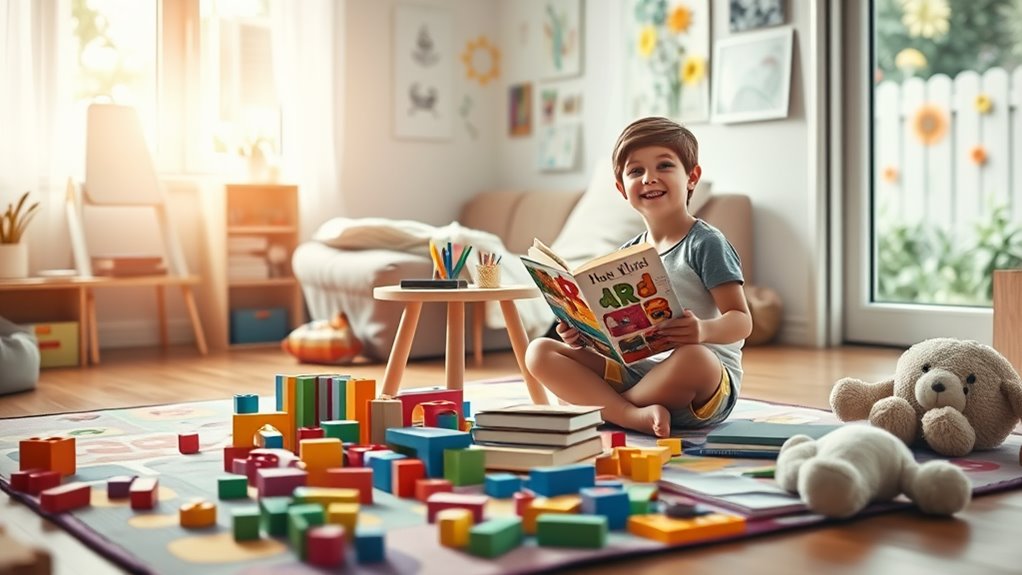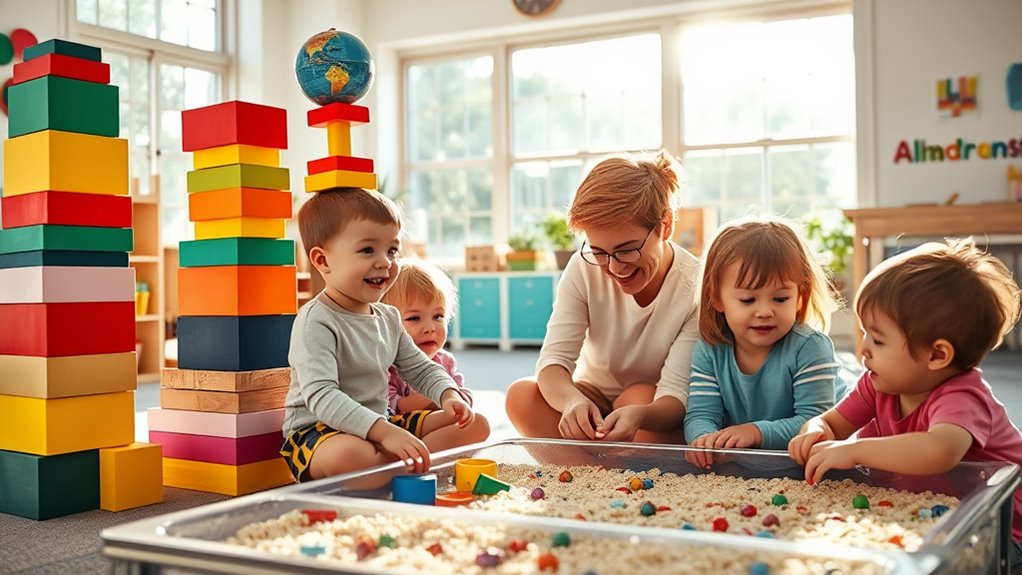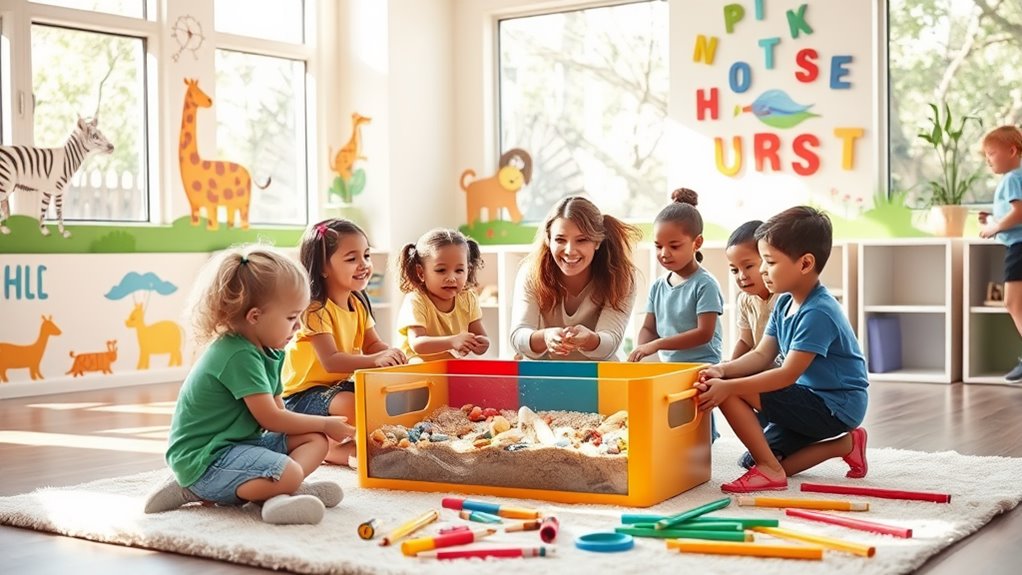Early Childhood Education Tips That Will Blow Your Mind!
Early childhood education is a thrilling journey, and you can enhance it with some amazing tips! Embrace play-based learning to nurture creativity and social skills, and foster a growth mindset that turns challenges into exciting opportunities. Don’t shy away from integrating technology; the right tools can spark curiosity and enhance critical thinking. Encourage outdoor exploration to ignite your child’s love for nature, and focus on cultivating emotional intelligence to help them navigate their feelings. Each of these strategies paves the way for an enriching experience—stick around, and you’ll discover even more transformative ideas!
Key Takeaways
- Incorporate play-based learning to enhance creativity, social skills, and problem-solving abilities in young children.
- Foster a growth mindset by celebrating effort and teaching resilience through storytelling about overcoming challenges.
- Integrate technology wisely by utilizing creative tools like digital storytelling to enhance communication and critical thinking skills.
- Encourage outdoor exploration with nature scavenger hunts to promote observational skills and appreciation for the environment.
- Cultivate emotional intelligence through empathy-building activities and safe spaces for emotional expression, supporting healthy relationships.
Embrace Play-Based Learning
Play is more than just fun; it’s a vital part of how children learn and grow. When you embrace play-based learning, you’re opening the door to rich opportunities for development. Dramatic play allows children to step into different roles, fostering creativity and social skills. They’ll navigate complex scenarios, negotiate with peers, and practice empathy—all essential skills for their future.
Incorporating sensory exploration is equally important. When kids engage with various textures, sounds, and smells, they stimulate their brains and enhance cognitive development. Think of activities like playing with sand, water, or clay; these experiences are more than just play; they’re building blocks for understanding the world around them.
As you create an environment that encourages this type of learning, you’ll notice how children become more engaged and independent. They’ll experiment, take risks, and solve problems, all while having fun. Remember, every moment spent in play is a chance for growth. So, embrace play-based learning wholeheartedly, and watch as children thrive in their development—both academically and socially. Your support in fostering this kind of environment will make a lasting impact on their journey.
Foster a Growth Mindset
As children explore through play, they develop more than just skills—they also cultivate their mindset. Fostering a growth mindset in early childhood is essential for helping kids embrace challenges and learn from setbacks. You can introduce engaging growth mindset activities that encourage resilience and perseverance. For example, create scenarios where children face obstacles and brainstorm solutions together, turning each challenge into a learning opportunity.
Using positive reinforcement is crucial in this process. Celebrate effort, not just achievement. When a child tries hard on a task, acknowledge their determination, saying, “I’m proud of how you kept trying!” This approach reinforces the idea that effort leads to improvement, helping children see mistakes as stepping stones rather than failures.
Incorporate storytelling, where characters overcome challenges, to inspire children. Discuss the characters’ journeys and the lessons learned along the way, connecting these stories to their own experiences. By consistently promoting this mindset, you’re equipping them with the tools to navigate life’s hurdles, fostering a love for learning that lasts a lifetime. With your support, children will develop a robust growth mindset, setting the stage for future success.
Integrate Technology Wisely
Integrating technology wisely into early childhood education can enhance learning experiences and spark curiosity. As you navigate this exciting realm, focus on tools that foster creativity and critical thinking. Digital storytelling is a fantastic way to engage young minds. By allowing children to create their own stories using images, audio, and animations, you’re not just teaching them to communicate; you’re encouraging them to express their ideas and emotions in innovative ways.
Moreover, interactive games can provide captivating learning opportunities. Look for games that challenge problem-solving skills and promote collaboration. These platforms can turn abstract concepts into tangible experiences, making learning enjoyable while reinforcing essential skills.
Encourage Outdoor Exploration
While technology can enrich learning, don’t overlook the wonders of nature right outside your door. Encouraging outdoor exploration not only nurtures curiosity but also enhances physical and cognitive development. One effective way to engage children is through a nature scavenger hunt. Create a list of items for them to find—like different leaves, rocks, or bugs. This activity sparks excitement and fosters observational skills.
Incorporating sensory activities into outdoor play is equally important. Encourage kids to touch the bark of a tree, feel the texture of grass, or listen to the rustle of leaves. These experiences help develop their sensory awareness and appreciation for the environment.
Don’t forget the power of open-ended questions during these explorations. Ask, “What do you think this bug is doing?” or “How does this flower smell?” Such questions promote critical thinking and language skills.
Cultivate Emotional Intelligence
Building emotional intelligence in young children is crucial for their overall development. When you focus on empathy building and emotional regulation, you’re equipping them with skills that foster healthy relationships and resilience. Start by modeling emotional awareness—express your feelings openly and encourage them to name their emotions. This practice helps children recognize their own feelings and those of others.
Engage in activities that promote empathy, like reading stories with diverse characters. Ask questions about how the characters might feel in various situations. This encourages perspective-taking and deepens their understanding of others’ emotions.
Create a safe space for emotional expression. Encourage your child to talk about their feelings, and practice emotional regulation techniques, such as deep breathing or counting to ten when they feel overwhelmed. This not only helps them manage their emotions but also teaches them how to respond to others in distress with compassion.
Frequently Asked Questions
How Can I Assess My Child’s Learning Progress Effectively?
To assess your child’s learning progress effectively, focus on specific learning milestones. Regularly track their achievements and challenges. Use playful activities and discussions to gauge understanding, ensuring you’re both engaged and informed about their development journey.
What Are Some Low-Cost Resources for Early Childhood Education?
Did you know 60% of parents report using DIY activities for learning? You can tap into community resources like libraries and local groups, providing affordable, enriching experiences that foster your child’s growth and creativity.
How Do I Handle Behavioral Issues in Young Children?
To handle behavioral issues, focus on positive reinforcement. Use behavior charts to track progress and celebrate successes. This encourages good behavior and helps children understand expectations, making it easier for you to manage challenges effectively.
What Role Do Parents Play in Early Childhood Education?
You play a crucial role in early childhood education. By actively engaging in your child’s learning, you can implement effective education strategies and enhance parent involvement, fostering a supportive environment that nurtures their growth and development.
How Can I Find Quality Early Childhood Education Programs Nearby?
To find quality early childhood education programs nearby, check local reviews like stars on a map guiding you. Look for program accreditation, ensuring each option shines bright, making your choice easier and more informed.




